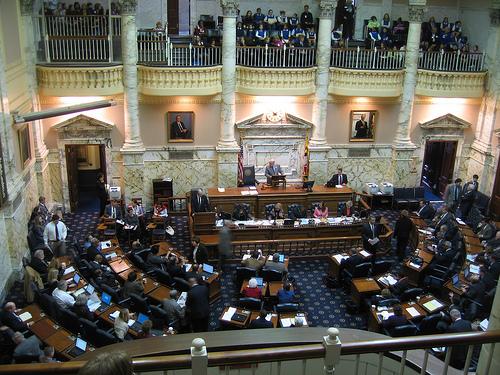
By: sneakerdog
ANNAPOLIS — An increase in gas taxes, a repeal of the death penalty and a renewed discussion of liability for pit bull owners are some of the issues currently on the table for Maryland’s 2013 legislative session.
In addition, the recent shootings at Sandy Hook Elementary School in Newtown, Conn., have prompted Gov. Martin O’Malley and others to promise gun control legislation in the upcoming session.
However, with the ongoing fiscal cliff discussions in Washington threatening to dramatically affect taxes and the economy, plans for the 2013 session in Maryland may be severely altered depending on the outcome.
Maryland has a huge public sector workforce, and is home to a multitude of government agencies and military operations. Any cutbacks in government spending or closure of government agencies would dramatically hurt the state.
Delegate Kathleen Dumais, D-Montgomery, the vice chair of the House Judiciary Committee, said that should the fiscal cliff be avoided, one of the most important issues in 2013 would be the proposed increase in gas taxes to generate funding for transportation projects.
“We have to somehow address transportation funding,” Dumais said.
Dumais said that she, along with the rest of the Montgomery County delegation, has supported raising taxes on gas, even if just by one penny, in order to generate desperately needed revenue. However, she thinks a bill proposing a statewide raise would face challenges because of the disparity between rural and urban areas.
The “Montgomery County delegation has been, generally speaking, willing to do that and vote for that. But it’s more controversial in other areas of the state,” Dumais said. “But I understand when you’re in a rural area and you have to drive farther just for groceries … it is sort of a different equation for a rural community than for a community like Rockville.”
Delegate Kathy Afzali, R-Frederick, represents a county with many rural communities like those Dumais described, and is adamantly against any increase in gas taxes.
“For me, in Frederick County, it’s particularly troublesome because I border three other states … (it is) very easy for people to purchase their gas out of state,” Afzali said.
The proposed increase in gas taxes is part of what Afzali calls “a war on rural Maryland,” and she said it would hurt middle class families already struggling to make ends meet.
“It’s extremely discouraging,” Afzali said. “I will be on the front lines fighting that.”
Donald C. Fry, president and CEO of the Greater Baltimore Committee, said that because of Maryland’s bad, and worsening, traffic conditions, the legislature has to come up with more funding for transportation projects.
“We have a situation where if we don’t start addressing the problems sooner rather than later, you’re going to have tremendous gridlock and that’s going to effectively impact economic growth,” said Fry, a former member of both the Maryland House and Senate.
A “perennial hot-button issue,” the death penalty, is also expected to make an appearance in 2013, said Sen. Brian Frosh, D-Montgomery.
“There will be another effort to repeal the death penalty,” Frosh said. “The members of the Senate have changed since the last time there was a vote.”
Frosh said this new composition of delegates and senators could potentially tip the historically balanced scale towards a successful repeal.
Frosh is one of the legislators who has said he will propose new gun laws in the wake of the killings in Connecticut.
He also said members of the Judicial Proceedings Committee “have some unfinished business,” relating to another controversial issue: pit bulls.
A Maryland Court of Appeals ruling earlier this year that said purebred pit bulls are “inherently dangerous,” and decided property owners also are liable for pit-bull-related incidents, has left the legislature searching for ways to respond.
Dumais said that because the effort to nail down legislation regarding pit bull owner liability during a special session in August failed, it is bound to resurface in January.
“Obviously, during the special session, we tried to do something,” Dumais said. “The House and the Senate have two very different ideas (of what) should be done.”
The Maryland Dream Act, Question 6, which legalized same-sex marriage in Maryland, and Question 7 which approved casino expansion, were all passed as a result of the last two legislative sessions, but, Fry said social issues will not be as predominant in 2013.
“Most of the legislators are hoping that this is a much quieter year than last year,” Fry said. “They’ve gone through a very tough legislative session last year as, well as a number of special sessions … they would hope that this is not going to have the same level of volatility.”
Other issues to watch for include offshore wind, the budget, the implementation of federal healthcare reform, as well as potential legislation promoting transgender equality.
However, House Minority Leader Anthony O’Donnell said that regardless of what shows up on the 2013 legislative agenda, fiscal security is the most important issue.
“The reality is, that going into the seventh year of the O’Malley administration, we have failed to put our fiscal house in order in the state, and we have not prepared for the looming fiscal problems,” O’Donnell said.
“Our focus should be solely on creating an environment of free enterprise and job creation,” O’Donnell said. “That is more than enough to focus on. That should be our first, foremost and only focus in the upcoming session.”
//essay-writ.org”;.




Write a Letter to the Editor on this Article
We encourage readers to offer their point of view on this article by submitting the following form. Editing is sometimes necessary and is done at the discretion of the editorial staff.